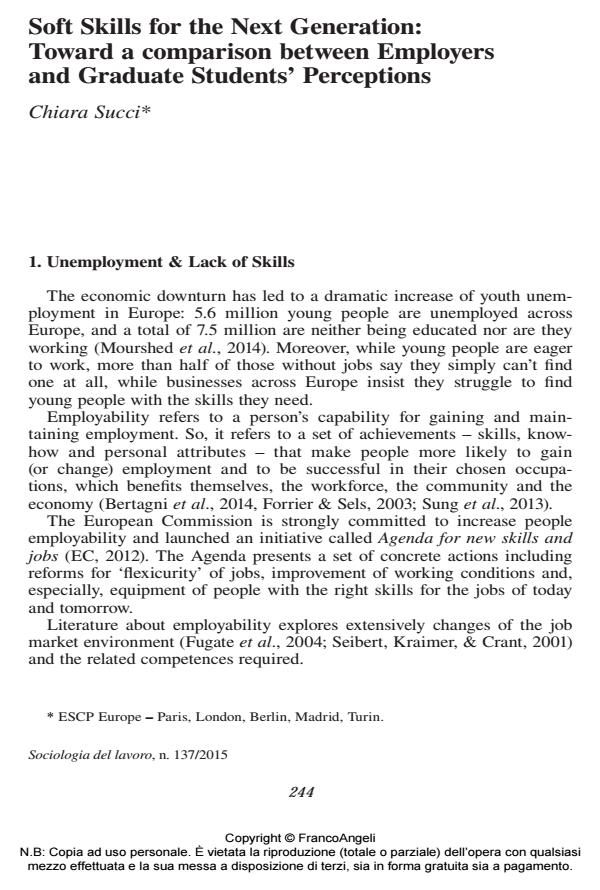Soft Skills for the Next Generation: Toward a comparison between Employers and Graduate Students’ Perceptions
Titolo Rivista SOCIOLOGIA DEL LAVORO
Autori/Curatori Chiara Succi
Anno di pubblicazione 2015 Fascicolo 2015/137
Lingua Inglese Numero pagine 13 P. 244-256 Dimensione file 110 KB
DOI 10.3280/SL2015-137015
Il DOI è il codice a barre della proprietà intellettuale: per saperne di più
clicca qui
Qui sotto puoi vedere in anteprima la prima pagina di questo articolo.
Se questo articolo ti interessa, lo puoi acquistare (e scaricare in formato pdf) seguendo le facili indicazioni per acquistare il download credit. Acquista Download Credits per scaricare questo Articolo in formato PDF

FrancoAngeli è membro della Publishers International Linking Association, Inc (PILA), associazione indipendente e non profit per facilitare (attraverso i servizi tecnologici implementati da CrossRef.org) l’accesso degli studiosi ai contenuti digitali nelle pubblicazioni professionali e scientifiche.
Fast changing environment entails several reflections about skills and attitudes required to face the increasing complexity brought by the "glocal, liquid and networked" world in which workers operate. Considering "declarative knowledge" as a commodity, due to the easier access to content (research engines, online universities, MOOCs, etc.), what does make the difference? Languages and digital literacy are clearly cited as key competences, but a more indistinct need about interpersonal skills and personal characteristics is drawn in the literature. A literature review addressing and structuring this issue is presented in the paper. Based on different studies a list of relevant attributes has been built and a research has been designed. A panel composed by managers of multinational companies and business school graduate students will be asked about new recruitment criteria and first job challenges. Soft skills will be assessed through a survey supported also by qualitative data (i.e. one-to-one interviews and focus groups) and by a comparative analysis. Comparison of data will indicate important areas of action for education institutions, HR managers, and leadership development organizations.
La società in cui viviamo cambia rapidamente e richiede una riflessione sulle competenze e attitudini che permettano di affrontare la crescente complessità portata da un mondo del lavoro più "liquido, connesso e glocale". Considerando la "conoscenza dichiarativa" sempre più vicina a una commodity per via del facile accesso ai contenuti (motori di ricerca, università online, MOOC, ), cosa fa la differenza? La padronanza delle lingue e la competenza digitale sono sicuramente citate come conoscenze chiave, ma dalla letteratura emerge anche il bisogno di acquisire maggiori qualità umane e interpersonali. In questo paper è presentata un’analisi della letteratura che approfondisce e articola questo tema. Partendo dagli studi esistenti, è stato costruito un indice di soft skill rilevanti ed è stato disegnato un progetto di ricerca. Infatti, un gruppo di manager di aziende multinazionali e un gruppo di studenti neolaureati saranno intervistati rispettivamente sui nuovi criteri di selezione introdotti in azienda e sulle prime sfide professionali. Le soft skills saranno valutate attraverso un questionario supportato da dati qualitativi (interviste e focus group) e da un’analisi comparata. I risultati indicheranno importanti aree di lavoro per istituzioni educative, HR manager ed enti formativi per lo sviluppo della leadership.
Parole chiave:Soft skill, interpersonal skill, leadership, competenze trasversali, occupazione, prossima generazione
- Soft skills and universal competencies: relationship of concepts, structure and assessment Yulia Borisovna Drobotenko, Natalya Aleksandrovna Nazarova, Irina Leonidovna Smagina, Ekaterina Vladimirovna Panasenko, M.A. Zakharischeva, G.R. Akramova, in SHS Web of Conferences /2021 pp.02003
DOI: 10.1051/shsconf/202112102003 - “T-shaped” lawyer — a new time lawyer? A.V. Averin, O.S. Kulakova, in Voprosy trudovogo prava (Labor law issues) /2021 pp.208
DOI: 10.33920/pol-2-2103-06 - The Importance of Soft Skills in Employability: A Two-Way Perspective Büşra Yılmaz, Bahar Urhan, in Alanya Akademik Bakış /2024 pp.941
DOI: 10.29023/alanyaakademik.1508405 - Leadership Approaches in Global Hospitality and Tourism Bahar Urhan, pp.23 (ISBN:9781668467138)
- Above-professional competencies and their importance O.S. Kulakova, in Voprosy trudovogo prava (Labor law issues) /2021 pp.100
DOI: 10.33920/pol-2-2102-03 - Life-long learning skills as a basis for individual learning style of university students Irina L. Smagina, in Vestnik of Samara State Technical University Psychological and Pedagogical Sciences /2021 pp.19
DOI: 10.17673/vsgtu-pps.2021.3.2
Chiara Succi, Soft Skills for the Next Generation: Toward a comparison between Employers and Graduate Students’ Perceptions in "SOCIOLOGIA DEL LAVORO " 137/2015, pp 244-256, DOI: 10.3280/SL2015-137015